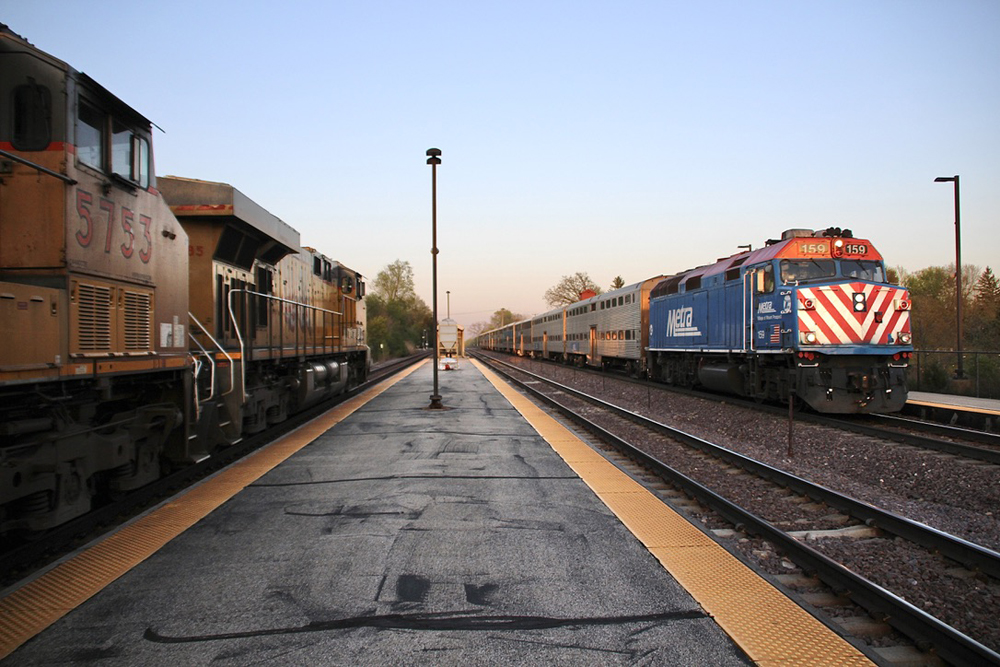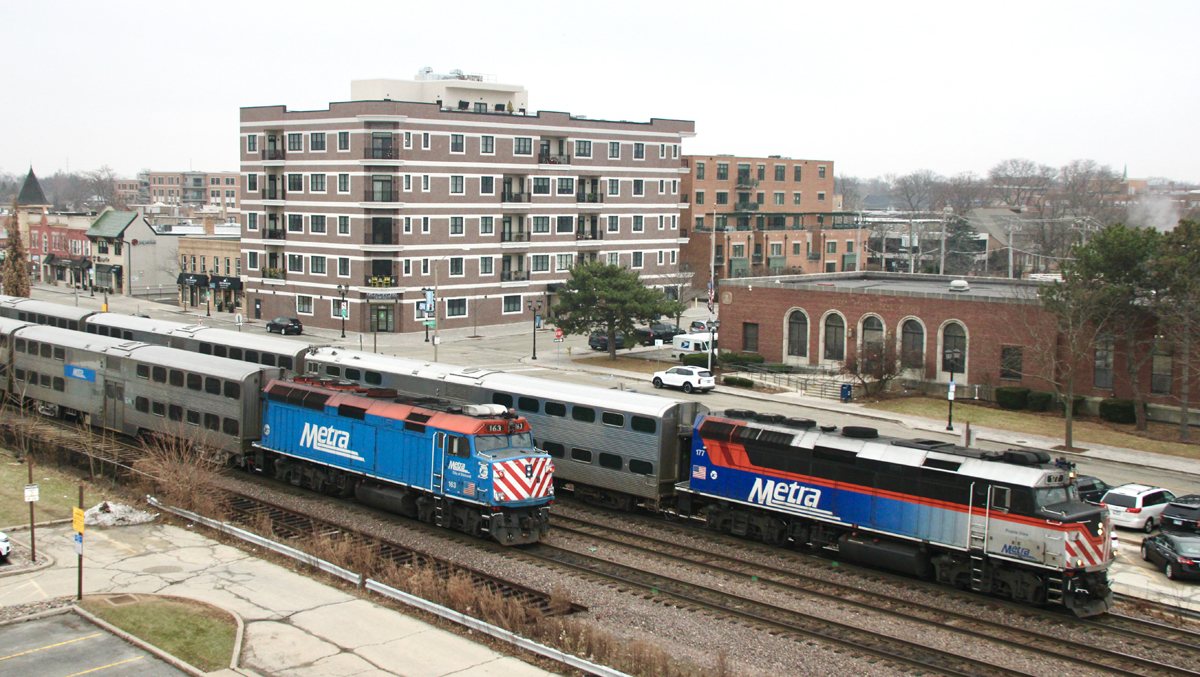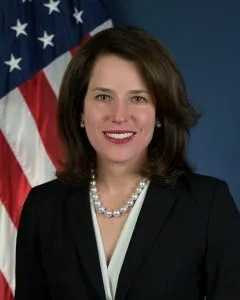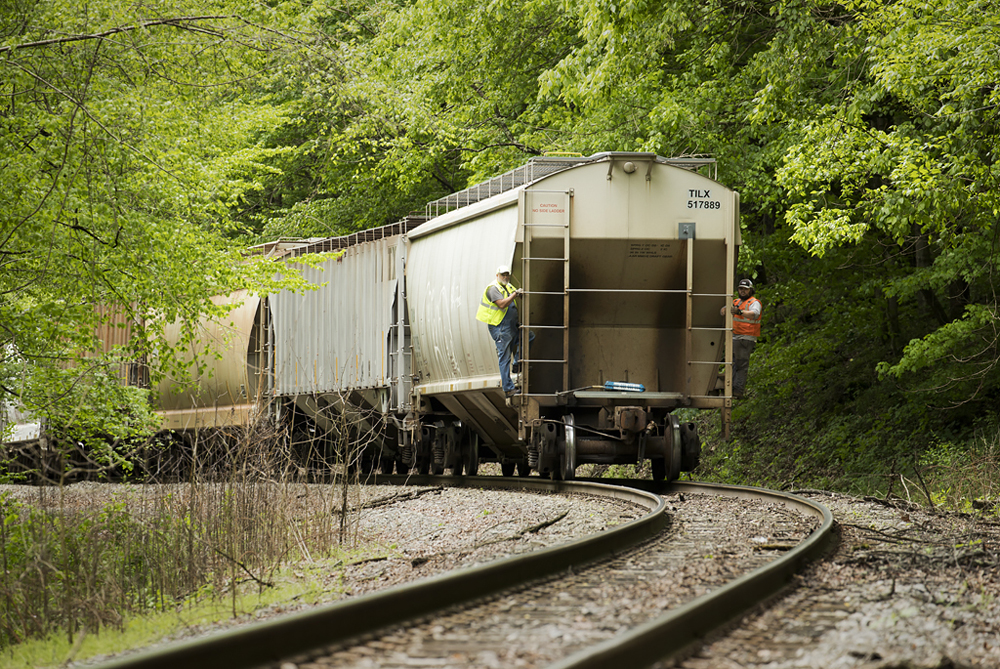
WASHINGTON — The Surface Transportation Board has granted Metra’s request for terminal trackage rights on three Union Pacific lines in the Chicago area, addressing the commuter operator’s concerns that UP could otherwise choose to halt commuter service in the absence of an operating agreement.
The ruling today [Sept. 3, 2025] ensures Metra service will continue on the Union Pacific North, Northwest, and West lines while the two sides carry on with what has been a long and arduous negotiation process. Noting sharp differences between the two sides’ views on compensation, the board says it “expects and encourages Metra and UP to undertake a concerted, good-faith effort to reach agreement,” but says if they cannot do so, it will establish compensation and conditions for use “in accordance with the statute.”
The STB set no deadline for an agreement but directed the parties to provide a status report by Nov. 3, 2025, and if additional time is required, to continue providing updates every 60 days.
Metra requested that the board provide the trackage rights in a March filing, saying its service was “in jeopardy” because of its dispute with Union Pacific [see “Metra asks STB to require Union Pacific to continue …,” Trains.com, March 7, 2025]. In its ruling, the board largely accepts Metra’s arguments for granting the trackage rights and defining the terminal trackage rights area as covering its operating region, and agrees that Metra’s request meets the “public interest” standard required to grant the trackage rights.
“There is, no doubt, a compelling need to grant Metra trackage rights over the UP Lines to provide commuter rail service in the Chicago area,” the three STB board members wrote in a unanimous decision. “Metra provides a critically important public service. … And UP has made clear that it has no obligation to provide passenger rail service — it secured a declaration from a federal court confirming as much.”
Metra had objected to a number of contract terms that Union Pacific attempted to unilaterally impose in June, which led it to request an injunction earlier in the summer. The board turned down that request, noting that UP had said it would not halt service and that Metra had said it would continue operating without accepting those terms [see “STB turns down Metra request …,” Trains.com, July 2, 2025].
The commuter operator said in a statement that today’s decision will allow it “to continue operating on the three UP lines while negotiations continue with Union Pacific over the conditions and compensation regarding our use of its tracks. Our goal throughout this process has been to reach an agreement based on objective industry standards, good-faith negotiations, and the public interest.”
Union Pacific said in a statement that it “has always been committed to ensuring that the commuter service provided to millions of Chicago riders will continue. With today’s guidance from the Surface Transportation Board, Union Pacific looks forward to working with Metra on a fair and reasonable resolution to the matter.”
UP had argued that Metra had not established the trackage rights are in the public interest because it has not refused the commuter operator access, and is willing to provide that access under a private agreement. It had claimed that the issue was a financial dispute, and that Metra was attempting to use the regulatory process to circumvent bargaining [see “Union Pacific urges STB to turn down Metra bid …,” Trains.com, June 5, 2025].
But the board said UP’s stance was that the freight railroad should have sole discretion to decide whether Metra could operate on its lines, and on what terms. “Accordingly, this is not a dispute ‘about money’ — it is about access,” the decision says. “If UP’s position were adopted, the future of commuter rail service over the three UP lines would be dictated by UP without any access to Board intervention.”
In ruling, the STB first dismissed Union Pacific’s contention that the board did not have jurisdiction because Metra is primarily an intrastate operation [see “UP asks regulators to dismiss …,” Trains.com, May 23, 2025]. The board determined that it had jurisdiction on two grounds: That the one Metra station in Kenosha, Wis., is sufficient to qualify for interstate status, and that the predecessor Interstate Commerce Commission had previously established its jurisdiction with decisions addressing purely intrastate Metra operations.
The decision was attributed to Patrick Fuchs, Karen Hedlund, and Michelle Schultz, the three remaining board members following the Trump administration’s firing of Robert Primus [see “Trump fires …,” Trains.com, Aug. 28, 2025]. While Primus is contesting that firing, he was not included in the decision and his biography has been removed from the STB website.














Why UP doesn’t consider selling the North and NW lines to Metra (at least where there is no freight) is something I do not understand. It seems like a burden to maintain, and it’s not a money generator.
Well, maybe if they charge Metra exorbitant rates for trackage rates they can make money, but it still doesn’t sit right with me.
Folks, I have a question. Union Pacific wants to own half the trackage in America. What exactly is their problem with three commuter lines in Illinois/ Wisconsin. Why are they doing this? What’s to gain?
They aren’t exactly endearing themselves to the STB, are they?
The issue at hand is what rate will Metra pay UP to use their tracks? The payments are supposed to cover the cost of maintaining the ROW to passenger standards.
UP has proposed rates that are in line with examples in California and other places that UP says are comparable to what Metra should be paying, which is way more than what Metra is used to paying.
Under the old contract for service, UP owned the not just the ROW, but the staff, the dispatching, operations and some facilities to support them. But now, much of those overhead costs have been transferred to Metra, so Metra wants a track usage rate that reflects the removal of those costs.
Looking at it from the UP perspective, only the UP West Line gets the majority of freight traffic in and out of Chicago, the NW and North lines not nearly as much. So UP says they are going to charge the going rate per mile to use tracks that don’t get a large amount of freight from their perspective, so they want to shift more of the cost of maintain those ROW onto the one who will benefit it the most and that be Metra.
The old saying that “freight pays the way” holds true here.
Metra has been looking at it as a “cost minus” perspective, while UP sees it as a “cost plus”. That is why they are so far apart.
What will happen is this. UP will force Metra to PUT IN WRITING what they will do. Later, when they try to weasel out of it, UP will pull out the agreement and say, OH NO YOU DON’T. YOU AGREED TO THIS, and Metra will have to do what they said they would. UP has worked with Metrolink/CalTrans and Metra for a long time. They know how these agencies work. They OWN THE TRACKS. In Utah, UTA had to buy and build their tracks separate (but in the same ROW) from the UP tracks. Thus they can do whatever they like. Metra, like Metrolink/CalTrans is a tenant and when you are a tenant, you have to do it the way the lease holder or owner says. SO Metra, if you want to have something (Right to run trains on UP tracks) you had better be prepared to DO SOMETHING. And if you are not willing to do something, then you had better be prepared to build you own tracks or buy them, paying the market price like any other real estate transaction. UP holds all the cards… You have to play nice or expect to be treated accordingly…